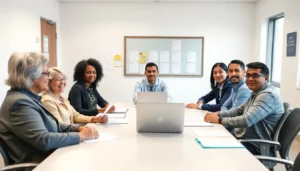Table of Contents
ToggleIn a world where traditional classrooms can feel more like prisons than places of learning, alternative education centers are shaking things up. These innovative spaces are designed for those who believe that one size doesn’t fit all when it comes to education. Whether it’s hands-on learning, personalized curriculums, or just a break from the cookie-cutter approach, alternative education centers offer a refreshing escape from the norm.
Imagine a place where creativity thrives and students aren’t just numbers on a report card. At these centers, education becomes an adventure rather than a chore. With flexible schedules and tailored programs, students can explore their passions while gaining essential skills. So, if the thought of traditional schooling makes you want to pull your hair out, it might be time to consider a different route—one that’s as unique as the students it serves.
Overview of Alternative Education Centers
Alternative education centers provide diverse learning environments that challenge traditional schooling norms. These centers accommodate students who may struggle in conventional classrooms, often emphasizing individualized learning experiences. Flexible schedules allow for personalized pacing, catering to each learner’s needs.
Hands-on activities form a core component of many alternative education programs. Students engage in real-world projects that promote problem-solving skills and creativity. For instance, these centers might feature curricula that include art, outdoor education, and entrepreneurship, enhancing engagement through practical applications.
Assessment methods differ significantly from traditional approaches. Many alternative education centers utilize project-based assessments, allowing students to demonstrate understanding through creative outputs. The supportive atmosphere fosters collaboration among peers, encouraging social interaction and teamwork.
Teacher-student relationships thrive in these settings as well. Instructors often act as mentors, providing guidance tailored to individual learning styles. This supportive dynamic creates a sense of belonging, which can lead to increased motivation and academic success.
Parents and guardians play a crucial role in the alternative education landscape. Many alternative centers encourage parental involvement in educational processes, welcoming feedback and participation. Such collaboration enhances the overall effectiveness of the learning experience.
Overall, alternative education centers strive to make learning an inspiring journey rather than a burdensome task. By focusing on the unique strengths and interests of each student, these centers transform the educational experience into one that respects individual differences and nurtures personal growth.
Benefits of Alternative Education Centers
Alternative education centers offer numerous benefits that cater to the diverse needs of students. These centers prioritize individualized learning and foster supportive environments that enhance academic success.
Individualized Learning Approaches
Individualized learning approaches thrive in alternative education centers. Flexibility in pacing allows students to progress at their own speed, preventing overwhelming experiences. Tailored curriculums meet specific interests and learning styles, ensuring that each student engages with the material meaningfully. Personalized assessments enable students to showcase their understanding in creative, relevant ways. Empowering students to take ownership of their education fosters intrinsic motivation, promoting a lifelong love for learning.
Supportive Learning Environments
Supportive learning environments define the atmosphere within alternative education centers. Collaboration among peers encourages social interaction and nurtures teamwork. Mentorship from instructors builds strong relationships, offering students personalized guidance and necessary support. Emotional and academic well-being become priorities, allowing students to thrive in safe, welcoming spaces. This focus on community contributes to overall student happiness, reinforcing a positive educational experience.
Types of Alternative Education Centers
Various types of alternative education centers exist to match diverse student needs and preferences. Each center focuses on different educational philosophies and teaching methods, creating unique learning experiences.
Montessori Schools
Montessori schools emphasize self-directed learning. Students engage in hands-on activities, allowing them to explore concepts at their own pace. The curriculum is child-centered, promoting independence and critical thinking skills. Multi-age classrooms enhance peer learning, enabling younger students to observe and collaborate with older ones. This fosters a sense of community and belonging. Teachers act as guides rather than traditional instructors, supporting each child’s individual learning journey.
Waldorf Education
Waldorf education focuses on holistic development. Curriculum integrates academics, arts, and practical skills to nurture creativity and imagination. Students often engage in storytelling, crafts, and music, enhancing their emotional and artistic expression. Each grade level emphasizes age-appropriate themes, stimulating curiosity and fostering a love for learning. The philosophy encourages connection to nature, often incorporating outdoor activities to promote environmental awareness and respect for the world.
Charter Schools
Charter schools provide educational alternatives within the public school system. They operate independently but adhere to specific educational standards, allowing for innovative teaching methods. Many charter schools focus on particular themes, such as STEM or arts education, tailoring their curriculums to student interests. These institutions often encourage parental involvement and community engagement, fostering a strong support network. Flexibility in operations can lead to improved student performance and satisfaction, aligning with the diverse needs of families.
Challenges Faced by Alternative Education Centers
Alternative education centers encounter several challenges that can impact their effectiveness. Overcoming these obstacles is crucial for their continued success and growth.
Funding and Resources
Funding remains a significant challenge for many alternative education centers. Limited access to financial support affects their ability to provide quality education and necessary resources. State funding often prioritizes traditional schools, leaving alternative options with fewer funds. Many centers rely on grants, donations, or tuition fees to sustain their operations. Inequitable resource distribution can lead to disparities in educational opportunities, affecting program stability. Approaches to diversify funding streams can help centers secure additional resources to maintain and expand their offerings.
Public Awareness and Perception
Public awareness about alternative education centers often lags behind traditional schools. Misconceptions about their effectiveness contribute to misunderstandings and skepticism among parents and educators. Some individuals perceive these centers as less legitimate, affecting enrollment numbers. Increased outreach efforts are essential to educate communities about the benefits of alternative education. Highlighting success stories and showcasing student achievements can change perceptions. Engaging local media and organizing community events helps raise awareness and fosters positive conversations around alternative education.
Alternative education centers represent a transformative approach to learning that prioritizes individual needs and fosters creativity. By offering personalized curriculums and flexible schedules, these centers empower students to engage with their education in meaningful ways. The supportive environments encourage collaboration and mentorship, enhancing both emotional and academic well-being.
Despite facing challenges such as funding and public perception, the benefits of alternative education are clear. As awareness grows and communities embrace these innovative learning models, students can experience a more fulfilling and enriching educational journey. Emphasizing unique strengths and interests, alternative education centers are paving the way for a brighter future in education.






